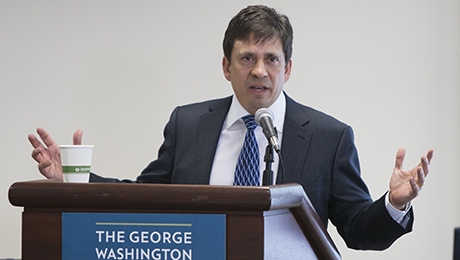You have /5 articles left.
Sign up for a free account or log in.

Nelson Carbonell, chair of George Washington University's board, addresses Faculty Senate.
George Washington University
Do professors at George Washington University have a bullying problem? The new chair of its Board of Trustees might think so, and he's expressed concern that non-tenure-track faculty members are on the receiving end of that bullying. To address the issue, the chair has said he's taking steps to extend academic freedom and greater access to shared governance to those without tenure. While some faculty applaud the new focus on non-tenure-track faculty concerns, others have questioned the validity of the chair's findings and the board’s involvement in faculty-faculty relations. Others have called out the university for criticizing a problem -- adjunct inequality -- its leaders helped create at the campus by hiring people off the tenure track rather than creating more tenure-track positions.
"We need to make a statement that says it's not O.K. to be a bully,” Chair Nelson Carbonell told the university’s Faculty Senate during a meeting last week. “It's not O.K. in this environment to create a world in which people don't feel free to think what they think and do what they do.”
The chair, who took office last year, spoke based on the results of the recent comprehensive review by the board and select faculty members of shared governance at George Washington, as outlined in the Faculty Code. The document, which lays out governance structures, tenure and promotion procedures and other key faculty matters, was last reviewed in 2003. Carbonell said that during the recent review, the task force heard repeated concerns about what kind of faculty members were able to participate in governance. Some 600 faculty members from each of the university’s 10 schools were interviewed or attended town halls as part of the process. The task force is set to present its final recommendations for updating the code to the Faculty Senate next month.
But Carbonell discussed with the faculty last week some of his findings – including vague references to faculty “bullying” and a greater desire among non-tenure-track faculty for a voice in governance. Carbonell also referenced faculty-administrative relations, saying that university will define a consistent role for faculty and administration in the selection and retention of deans and administrators.
Dean-faculty relations have been the cause of some controversy recently at George Washington. Three deans have either been fired or left their positions in the last year. Doug Guthrie, former dean of the business school, has said personality conflicts with faculty members played an outsized role in his termination as dean (he remains on the faculty). The university has said otherwise.
Among other changes, Carbonell also proposed streamlining the tenure process, perhaps by creating a small, universitywide committee that would administer tenure, potentially replacing department committees. The board would no longer “rubber stamp” candidates, he said, noting that the proposal was still being fleshed out.
“Shared governance is a wonderful institution here, and we need to not only preserve it, but strengthen it as we move forward,” he said.
Carbonell added: “It is important for us to realize change is possible here.”
Faculty members have said that non-tenure-track professors merit more involvement in shared governance, as the chair suggested. Currently, only tenured faculty members may be elected as senators. Assistant professors and non-tenure-track professors can join committees only.
At the same time, faculty members expressed some concern about the board intervening in faculty matters, and questioned whether bullying was really a problem at the university. Via email, Sheherazade Rehman, professor of business and Senate Executive Committee chair, said: “I believe the Faculty Code is quite clear on the rights of tenured faculty and I do not wish to see tenured faculty rights watered down in any way. The rights of tenured faculty are fundamental to having an institution that has genuine robust shared governance.”
She continued: “Having said that, I do, however, believe that over the years we have added many different types of faculty to our community and there is definitely a need to clearly define in a transparent manner the non-tenure-track full-time, part-time, clinical, research and contractual faculty status, rights and responsibilities. This definition clarification of various types of faculty does not, however, need to repudiate the current rights bestowed onto tenured faculty.”
Greg Scholtz, director of tenure, governance and academic freedom at the American Association of University Professors, said it was unusual for a board chairman to address such matters with the faculty. Generally – and according to AAUP policy – changes to faculty codes or handbooks that concern the primary domains of the faculty, such as a tenure and curriculum, originate with the faculty. In this case, he said, it seems to be the other way around.
But Scholtz said that AAUP does support extending academic freedom and governance roles to non-tenure-track faculty.
Christopher Lornell, a part-time professor of music at George Washington and vice president of higher education for Service Employees International Union Local 500, which represents about 1,100 part-time faculty members at the university, agreed that such protections should be afforded to those off the tenure track. But he said that charges of bullying "simply [don't] resonate with me, and I have not had anybody in music or elsewhere come to me and say they've been bullied by tenured faculty," he said.
Other faculty members, both on and off the tenure track, said they'd never heard accounts of "bullying" in their programs.
Keith Hoeller, a non-tenure-track faculty advocate and founder of the Washington Part-Time Faculty Association, said the issue of bullying adjuncts is real, and it isn’t specific to George Washington. The “two-tier” system of faculty -- those with tenure and those without – inevitably results in such abuses, he said.
“When you have a two-track system and the tenured faculty serve as de facto supervisors of the contingent faculty, then you have a situation that’s rife for bullying.”
George Washington has 1,225 full-time professors. The university says 75 percent of full-time faculty are supposed to be on the tenure track or tenured.









